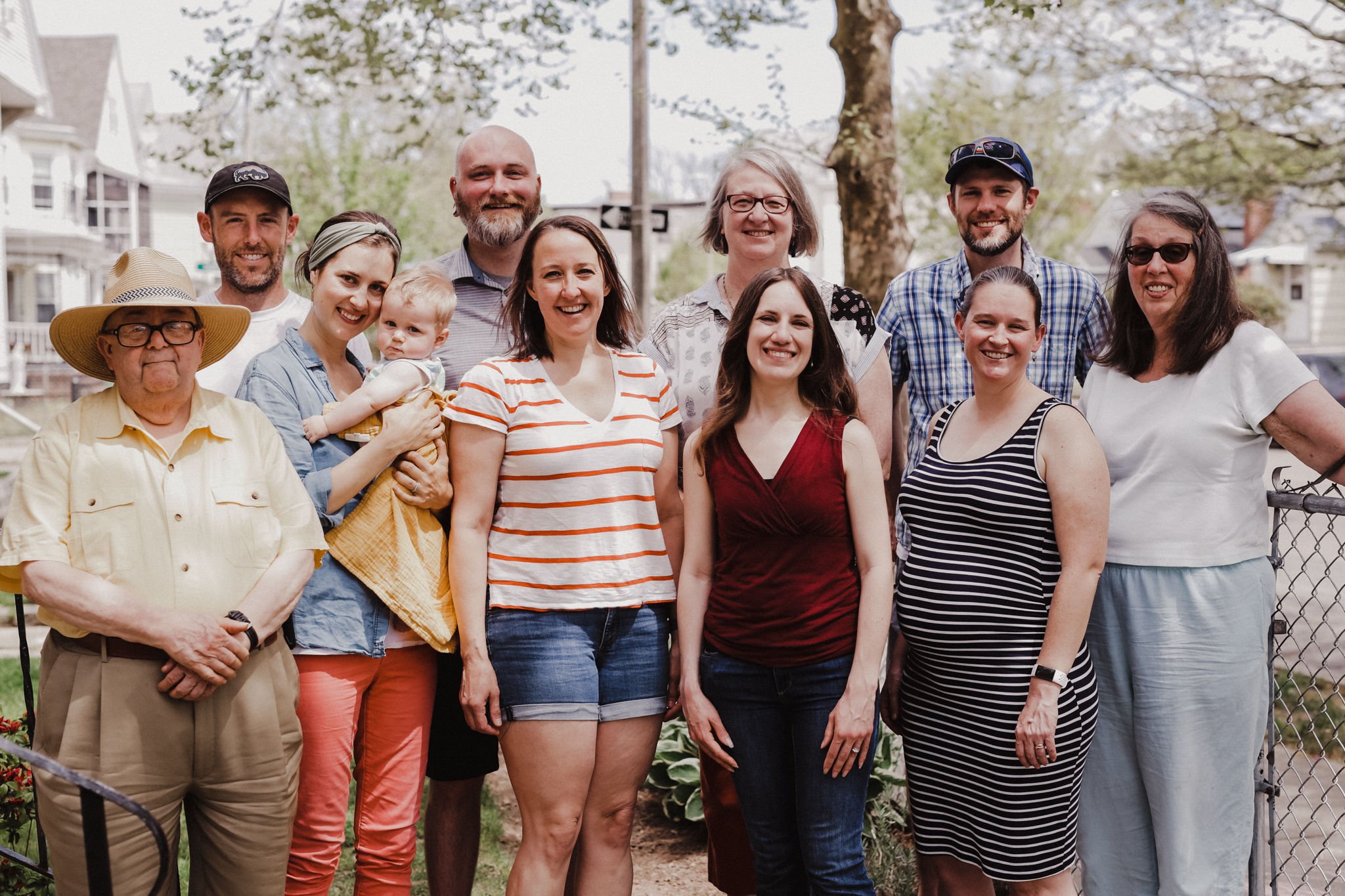
Origin Story: How RCCI's first cohort took shape
by Megan Lietz, Director, Race & Christian Community Initiative, with contributions from the inaugural cohort alumni
The meeting didn’t go as I’d expected. But I shouldn’t have been surprised considering my hopes for the group. What was intended to be an icebreaker expanded to fill most of our time. But I chose to not stop the beautiful and vulnerable sharing that testified to the postures and strength of the relationship of the group. As we shared updates and struggles and chose to be present with one another in the messiness of life, I could see many of the values that we upheld in our journey: practicing humility, holding different perspectives in tension, leaning into discomfort, being OK with uncertainty, letting go of control, walking in faith.
At the five-year reunion of RCCI’s inaugural cohort, I witnessed people being in community in ways that were authentic and testified to the journey we’d been on. An unexpected journey brought together eight white people, who had been shaped by the evangelical tradition,* to learn about race. Over the course of four years, this journey not only served to develop and pilot RCCI’s first cohort and support and accountability group — but also taught us how to be together in ways that are more fully human.
But we didn’t start there. God was working in each one of our lives and preparing to weave our individual journeys into a collective story.
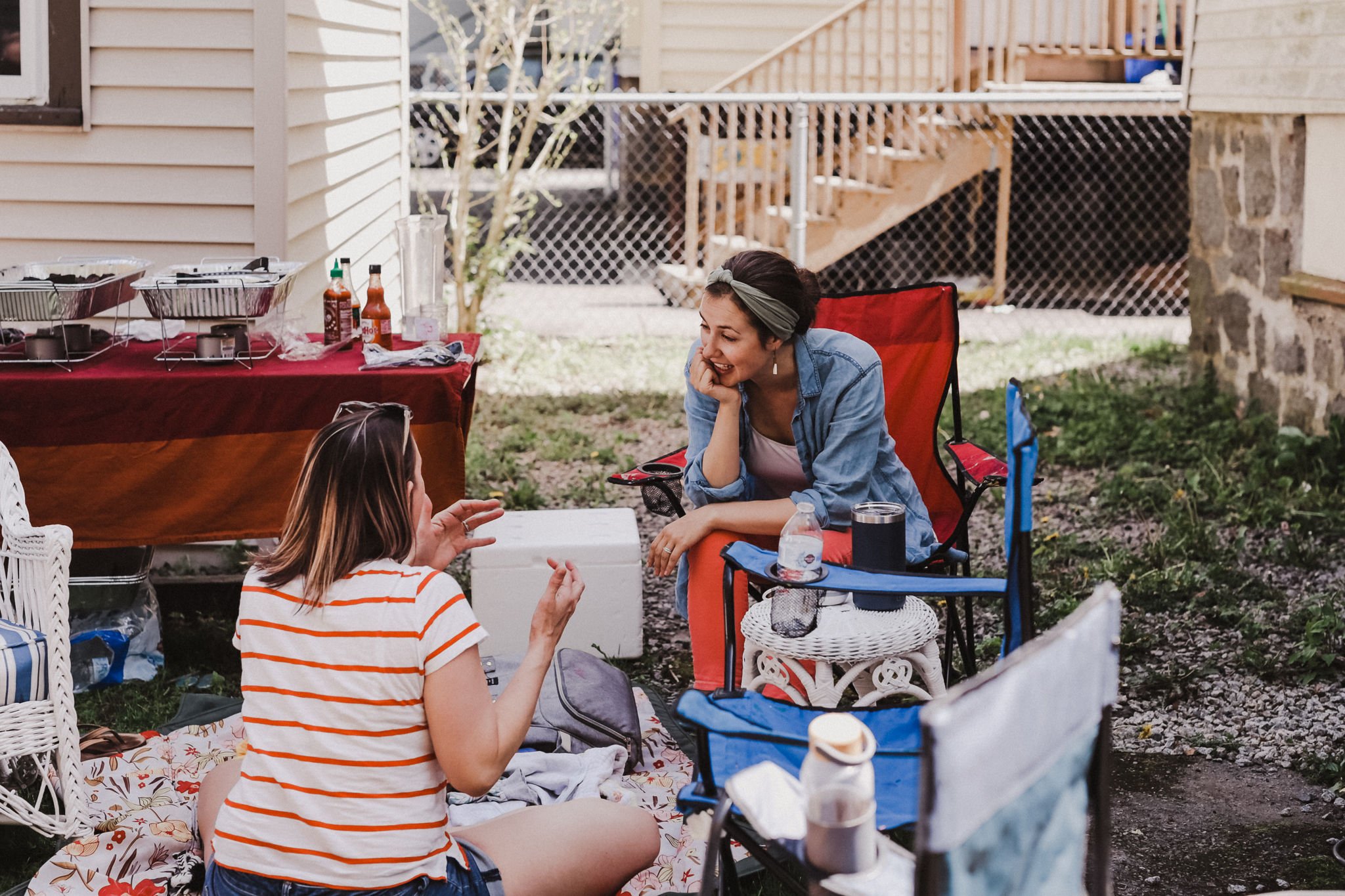
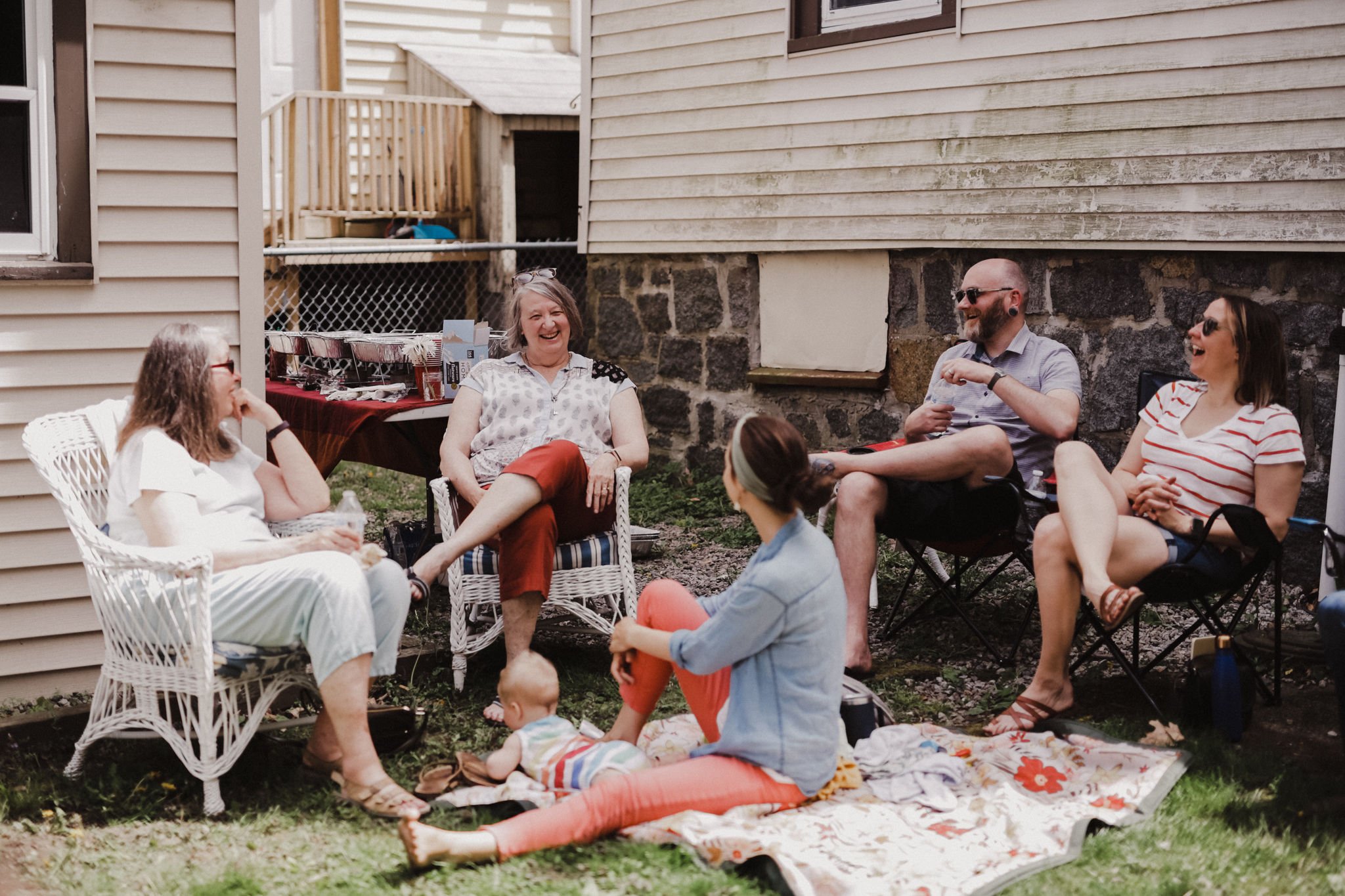
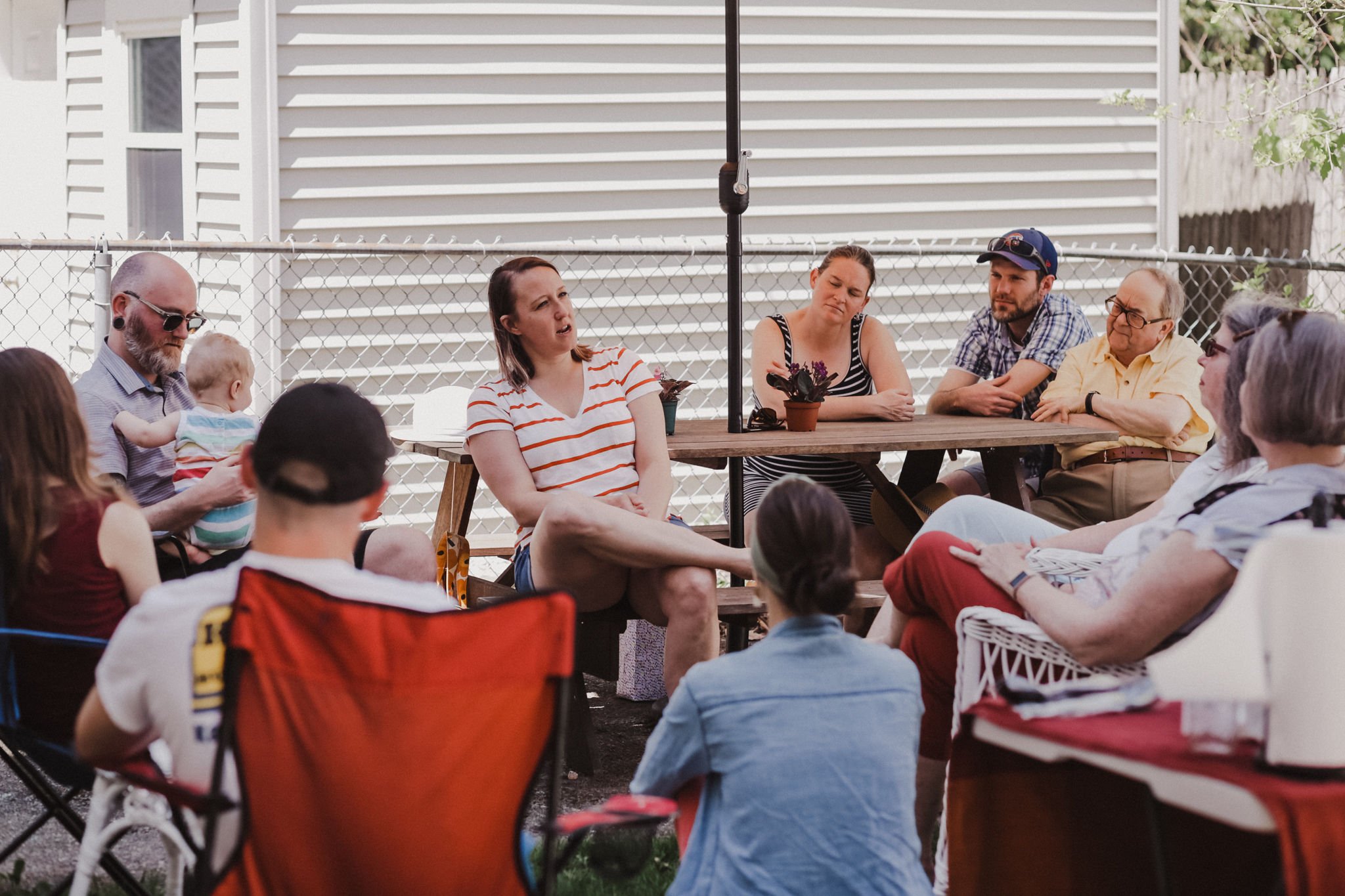
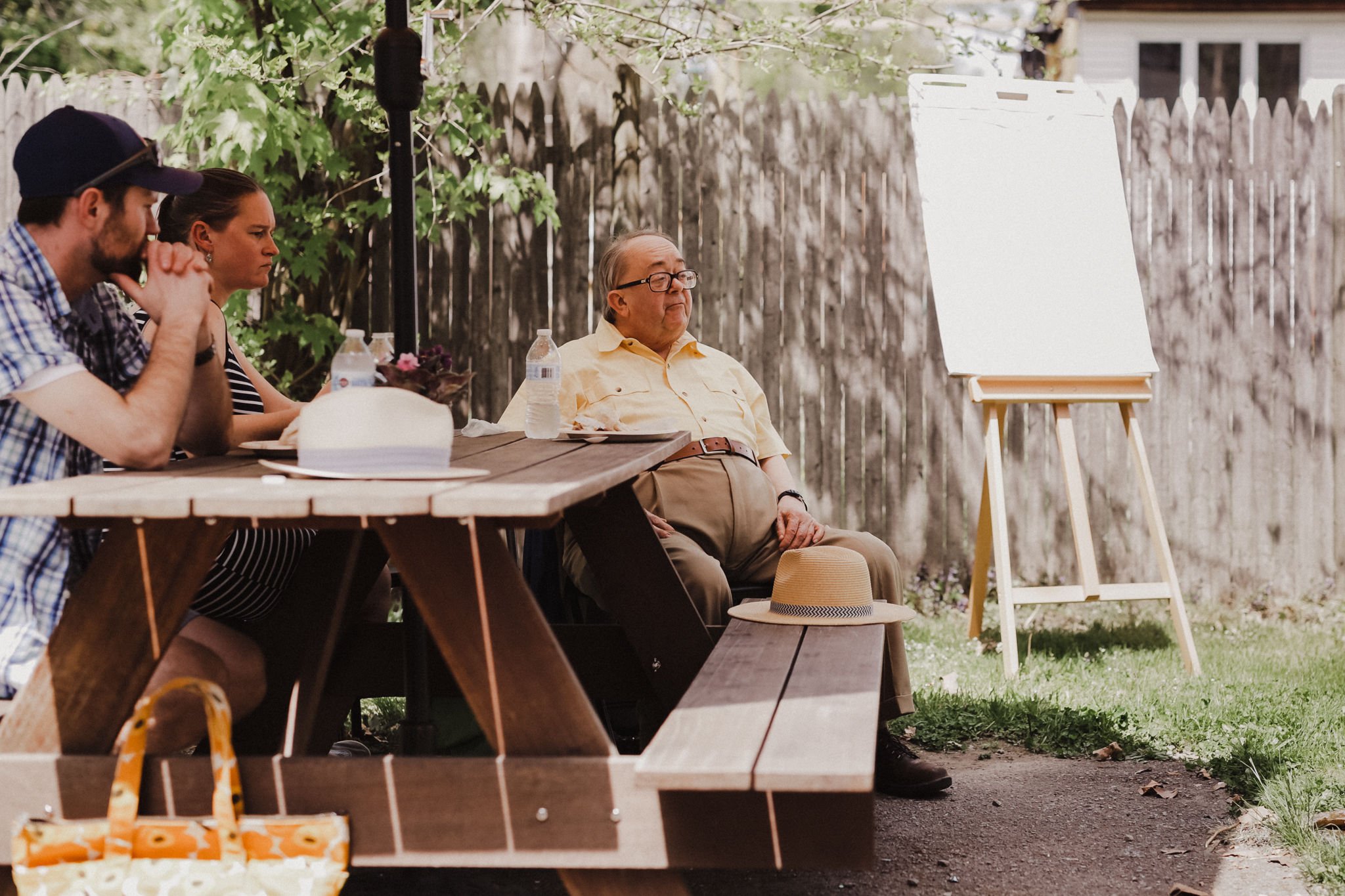
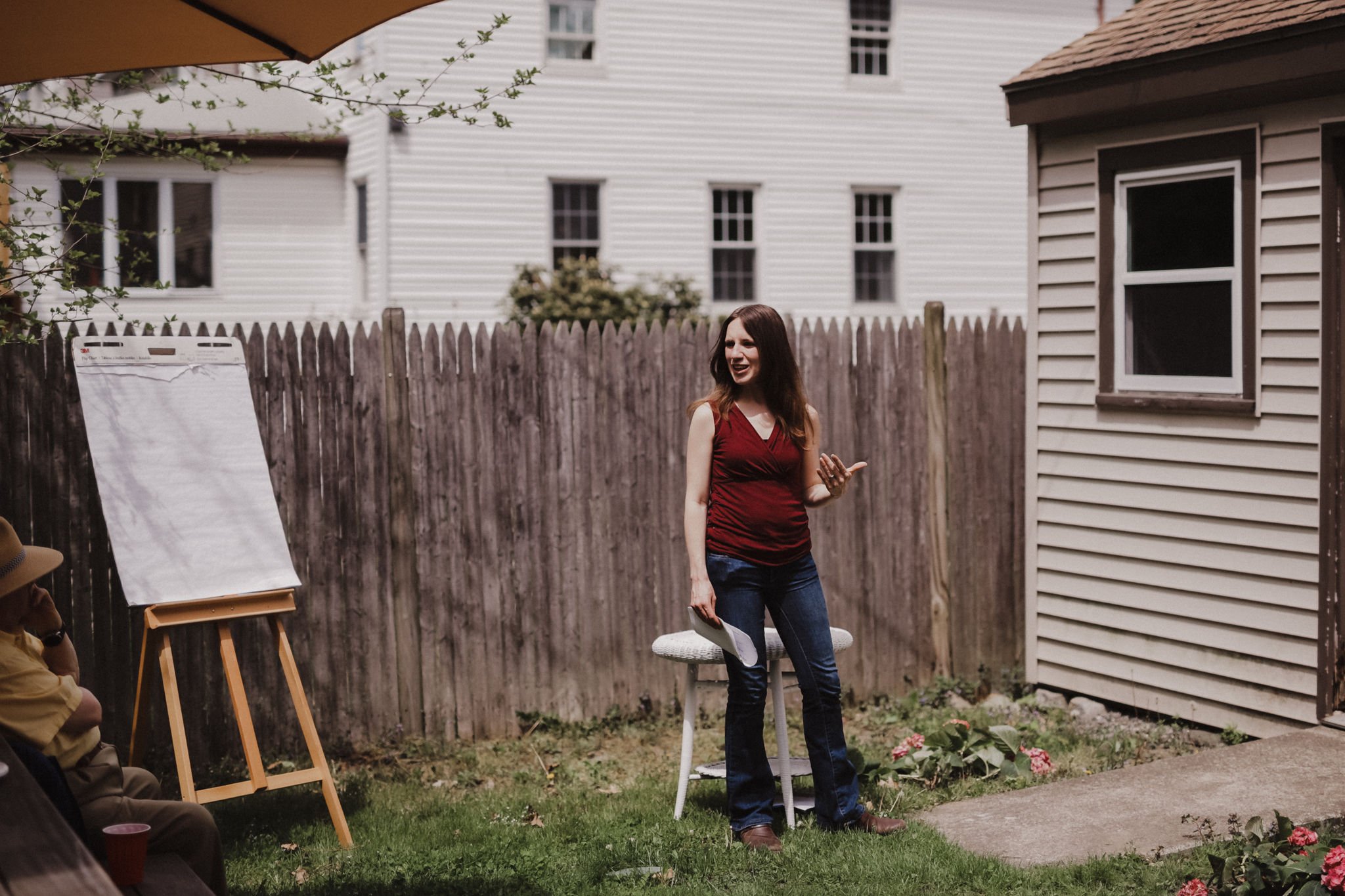
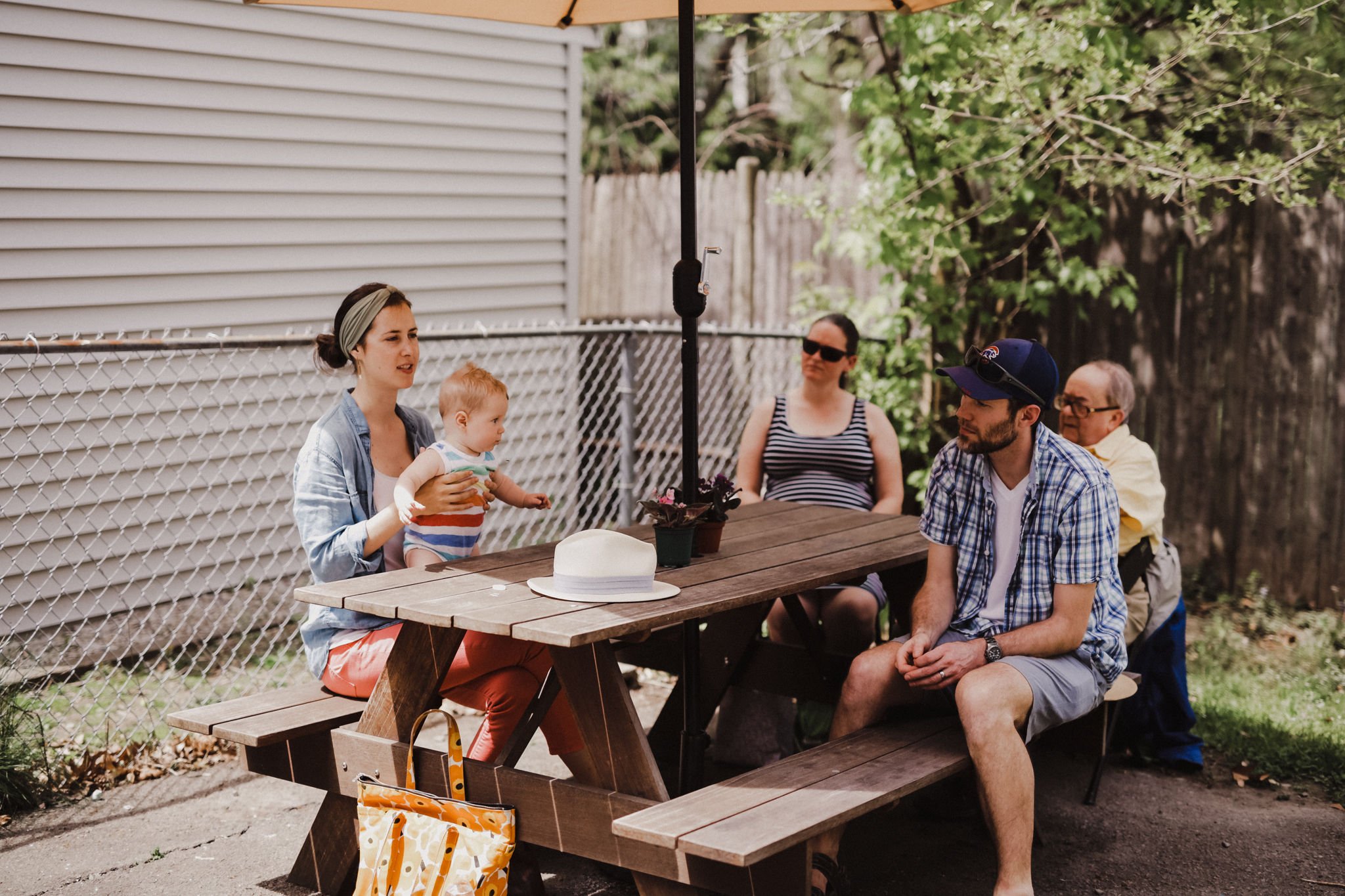
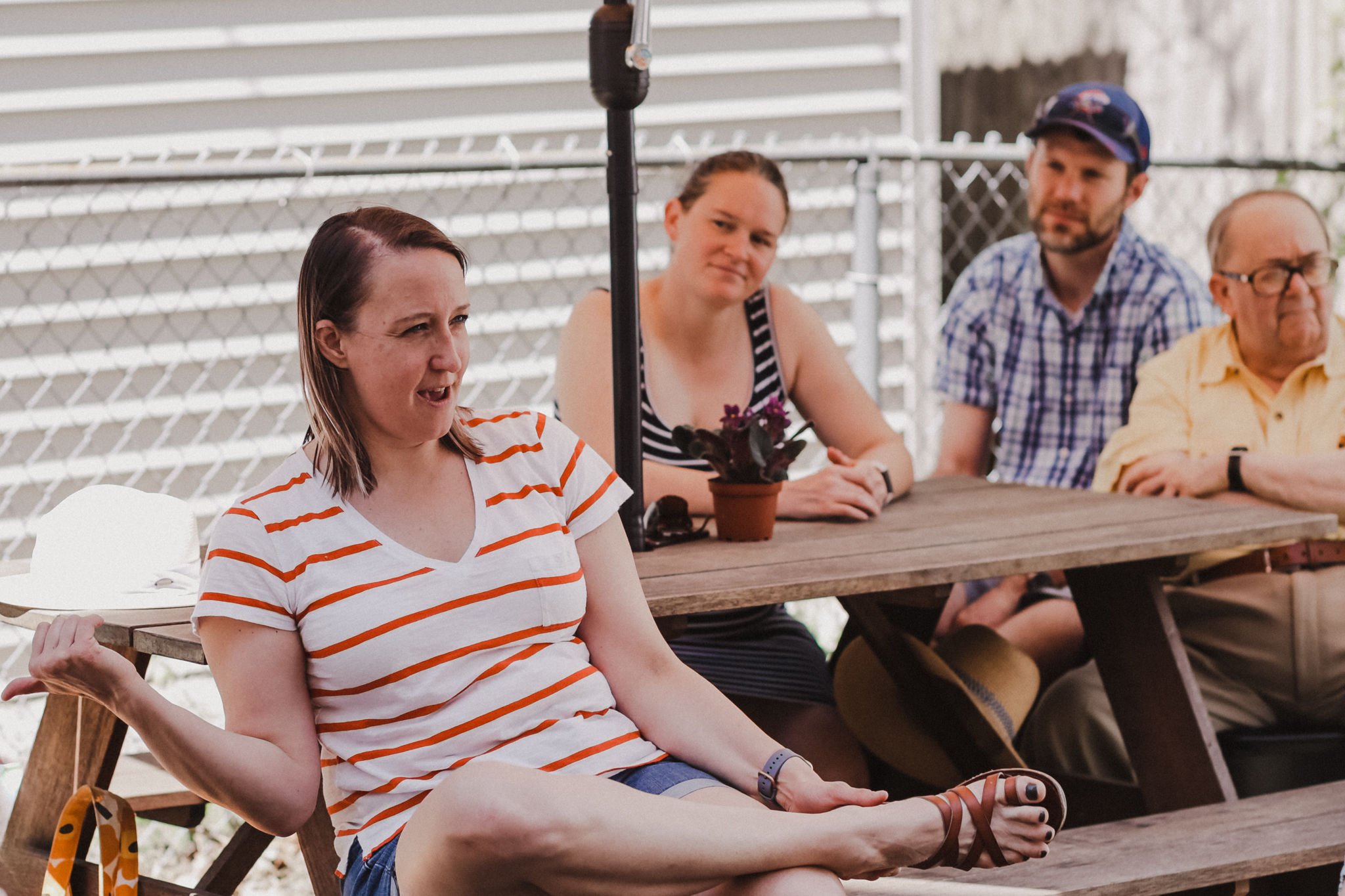

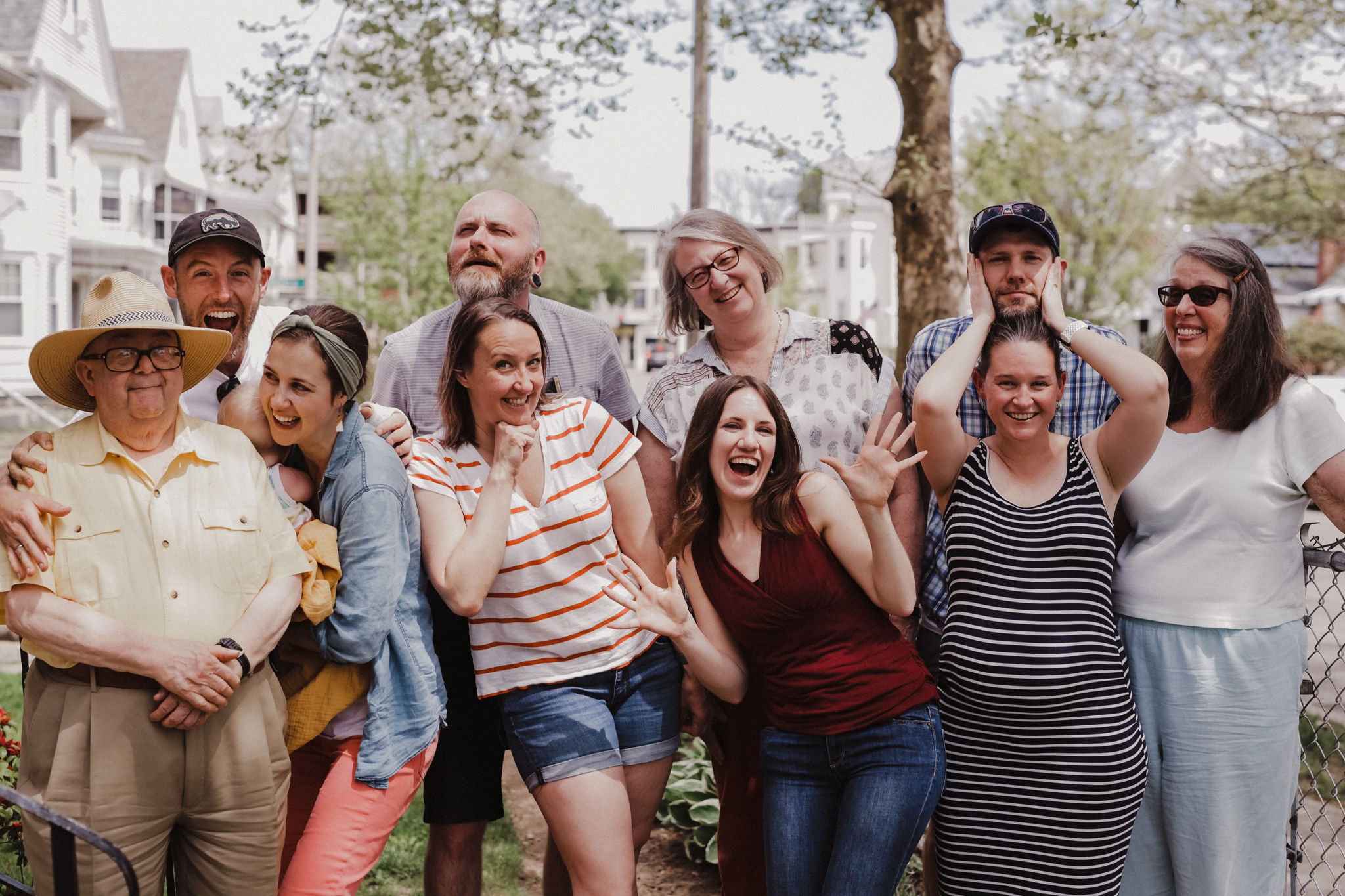
Scenes from RCCI’s inaugural cohort reunion in May 2022. R9 Foto for The Emmanuel Gospel Center.
Kate and Jeremy had recently moved from Rochester, New York, and were searching for ways to respond to the racialized patterns from their former neighborhood they noticed also existing in Boston. Andrew had fellowshipped across racial lines and followed Black leaders during the civil rights movement and wanted to connect to God’s people continuing this work today. Dana was serving as the Pastor of Social Justice and Multicultural Ministry at a white suburban church and was intentionally connecting across racial lines in the city. Kristina was transitioning between churches and seeking to find where the Church was engaging issues related to race, recognizing that that might not be happening in a congregation. Scott and Shelton had just returned to the U.S. after living in South Africa and were looking for white affinity groups where they could dismantle racism in themselves and their communities. Linda had heard a compelling presentation on race from a respected Black woman in her congregation just a few months prior and saw herself as part of the problem for the first time.
Many participants had been watching what was going on in Ferguson and wrestling with their understanding of the world following the 2016 election. “I don’t think I know this world!” Kate remembered herself thinking in response to the 2016 election. Participants were asking questions and looking to explore them in community.
Kristina shared, “I didn’t see the Church addressing racism … I got frustrated with my church talking about justice only as a side ministry or an afterthought. It wasn’t central. I was drawn to the cohort because I thought ‘these are the conversations that need to happen in the context of faith communities!’ — but those faith communities aren’t having them.”
A diagram by Dana Baker showing her personal journey toward racial reconciliation.
I wonder where you might see yourself in our stories.
We were all coming from different places. Our diversity of experiences and different points on our racial awareness journeys were an asset that helped us grow in knowledge and empathy.
But how did we all get together? And what helped knit us into a community?
“A Word to White Evangelicals”
In many ways, it began with a blog post. After a year of laying a foundation to start a ministry that engaged Christians — particularly white Christians — in issues related to race, I wrote a blog post called “A Word to White Evangelicals.” It was a call to action. Yet as I prepared the article for publication, my editor, pointed out that I didn’t offer an opportunity for people to act. So at the end of my blog, I invited white evangelicals to join me for a conversation.
I’d never written a blog before. I didn’t know who might read it or who might respond to my call. Much to my surprise, eight white people, shaped by the evangelical movement, gathered together on a snowy April morning in 2017 to talk about race. We reflected on our racial awareness journeys and talked about the seasons we were in, where we’d like to go as well as next steps. It was a simple conversation, but for those who didn’t often talk about race with other believers, it felt like a breath of fresh air.
Cohort participants gather for a meeting in 2017. The Emmanuel Gospel Center.
We shared some of what we learned from our conversation in this blog post.
But what we talked about doesn’t stand out to me as much as the enthusiasm people had to continue the conversation. I didn’t know what that looked like. I didn’t know what the next steps would be — and I didn’t feel ready. That said, I was excited to learn and committed to explore issues related to race in Christian community.
Exploring what it might look like to learn in community
Without a good sense of the path ahead, I invited discussion group members to learn with me. It wasn’t that I was unacquainted with issues related to race — on the contrary, I had been living in and serving with communities of color for nine years. But leading the conversation was new to me. I was also unsure of how to nurture transformation within my own people.
As a planner, jumping into such uncertainty made me uncomfortable. Yet confident in my convictions and feeling empowered by the Holy Spirit, I was choosing to take a risk, trust the Lord, and learn as I go.
Four of the eight attendees chose to jump in — Kate, Jeremy, Andrew, and Dana. As we decided to read Debby Irving’s book, Waking Up White, and invite others into the journey, Kristina and Linda joined in. “Reading [Waking Up White] was really a wake-up call,” Linda remembers. Our final cohort members, Scott and Shelton, would join later in the discernment process before we launched our cohort community.
This was the beginning of six months of journeying together, seeking to understand what it could look like to learn about race as a community of white Christians — and doing so as we went. During this time we explored topics like our motivations for engaging racial justice work, our biases and blindspots, personal growth areas, and the importance of hearing from people of color. Through this experience, we developed a shared language and culture for the group. We also wrestled with current events like the rally of white supremacists in Charlottesville, Virginia, and supported one another in taking local action in response.
We figured out the curriculum as we went, based on people’s interests and the needs of the group. Often, I felt just one step ahead of participants, learning and planning the week before we met. Also, as the mother of a 1-year-old child at the time, I rarely had the energy I would have liked to have had. I felt like I was leading from a place of weakness. I saw our meetings as a series of humble offerings to the Lord that he took and blessed, not because of anything I did, but because of what he wanted to see done among his people. Time and time again, by God’s grace, ideas, energy, and leadership — often better than what I could offer — would emerge at just the right time from the group. God moved through each participant. We learned, grew, and were transformed together in a way that gave me a deeper appreciation for the interdependence of the body of Christ.
While I like to think I contributed to the success of the group, the most significant action I took was simply creating a space where conversation could happen. People came in troubled by racism and injustice. They came in looking to Jesus and walking in faith. God had stirred their hearts and spirits, but many of them — and far too many white evangelicals — weren’t finding spaces to talk about racism in the Church. It was in simply creating space to meet, that we created space for God to move. I wonder what the Lord might continue to do if the Church would give him the opportunity.
Entering into covenant
After six months of exploration, the eight of us decided to formally enter into a covenant on Oct. 14, 2017, to pilot what would become our inaugural cohort. We met every other week and explored topics that were of interest to the group such as biblical and theological foundations for racial reconciliation, “whiteness” and “white allyship”. We brought in guest speakers of color to impart frameworks and better understand the impact of racism in our society and daily lives. Our time was centered around dialogue, reflection, and shared experiences like creative exercises or field trips such as attending a Debby Irving lecture or visiting a predominantly Asian-American church.
As cohort members reflected on this season of our journey at our reunion retreat, they shared how the cohort helped them gain the knowledge and shared language to talk about race. They also recalled wrestling with the relationship between concepts like “white people,” “white culture” and “white supremacy”. This helped them root themselves in their God-given identity and engage with socially constructed realities in ways that are healthy and challenge the racial status quo. Kristina shared, “I learned that the things I perceive as normal in society are actually highly influenced by white culture and conditioning. Now I can step back and ask ‘why’ and approach different perspectives with much more humility rather than assume ‘my way is the way that the world works.’” Scott added, “The resources we read and conversations we had opened my eyes more consistently to the realities of white supremacy that are present in ways that I can choose to ignore in my white privilege.”
Some of the members of RCCI’s first cohort in 2018. The Emmanuel Gospel Center.
Folks also mentioned the critical importance of hearing the perspectives of people of color. They experienced resources by BIPOC creators and welcomed guests such as Rev. David Wright and Mako Nagasawa. In reflecting on a presentation by Rev. David Wright, for example, Jeremy remembers being challenged by Rev. Wright’s assertion that “we can’t be re-conciled because there never was a time when white folks and people of color were ‘conciled’ in the history of our nation.” Kristina added, “There has always been a power discrepancy.” Rev. David used the imagery of a ditch to represent the chasm of inequality caused by racism. Linda remembered Rev. David saying, speaking to white people,“You’ve got to fill in this ditch … but I’m in this ditch with you.”
Dana added, “It was important to hear from BIPOC folks that meeting as white people was OK. It actually equipped us to better work with people of color, as we pursued our own learning and were not relying solely on BIPOC to be our ‘sources’ of information.”
The cohorts helped people increase their knowledge to effectively address issues related to race and increased their desire for action. While this was an important step, it fell short of action. It was with this in mind that the now cohort alumni committed to exploring next steps. Ultimately, they would pilot a support and accountability group that helped white evangelicals take ongoing anti-racist action.
“I’ve grown in understanding my responsibility in the problem of racism and my desire to speak up.”
Imagining next steps: Developing RCCI’s support and accountability group
As we thought about what it might take to move us, as people shaped by white evangelicalism, from knowledge to action, our support and accountability group took shape.
Through collaborative visioning and conversation throughout 2018, we imagined a year-long support and accountability program. It helped people personally and collectively discern their goals for action, stay accountable to these goals through monthly small groups, and be equipped through bimonthly large-group gatherings that provided space for teachings, dialogue, or reflective exercises that spoke to what was arising in the groups.
While having an idea of a program was a first step, we were also coming to realize that it wasn’t just about what we did but how we did it that mattered.
We reflected on our experience in the cohort and identified the beliefs, values, postures, and approaches that we felt were key for effective action. Some of what we identified included: humility, authenticity, teachability, self-examination, repentance, perseverance, and bringing our whole selves into the journey. It was these guidelines that would shape our ways of being together as a group.
Andrew remembered that we explored the importance of “conversations that permitted us to incorporate knowledge into our understanding and being. We encouraged people to ask questions … and test hypotheses … and recognize questions that obscure clarity.”
We weren’t only inviting people to take action, but inviting them into shared beliefs, values, postures, and practices that we felt reflected and nurtured the redemptive work of Jesus.
Piloting a community for sustainable, anti-racist action
When we piloted our first support and accountability group in 2019, we invited cohort alumni from our first and second cohorts, as well as people with similar experiences to join. Beth, Daniel, Emily, Laura, and Tim jumped in.
In recognition of the importance of trust and relationships in this work, we began with over four months of simply getting to know one another and sharing our racial awareness journeys. If we were going to be honest about what we were doing, how we were doing it, and where we were inevitably struggling along the way, we’d need to build trust. We also needed to understand where people were coming from to help them get to where they needed to go.
While we worked to build relationships in the large groups, the small groups served to help white folks discern their action steps through personal and collective discernment. The discernment process — and the ways we chose to be together — encouraged people not only to engage their minds, but also their hearts and spirits. Participants talked about the value of “getting out of their heads,” seeking the Lord, and engaging different parts of themselves for clarity and transformation.
“The process of communal discernment was really helpful,” Dana wrote. “I started with some rather ‘high level’ strategic goals about how to impact relationships between white leaders and leaders of color and, by the end, I realized I needed to work on my own relationships with people of color. But it took input from multiple people in my group over the course of the four months to put those original goals aside … I couldn’t have gotten there on my own because I’d been so socialized into this kind of strategic thought process.”
“The cohort was about knowledge. … The support and accountability group was about action — how does knowledge translate and show up in my life.”
Goals people lived into included talking to white friends and family about race, supporting businesses of color, volunteering for DEI initiatives, furthering anti-racism in the workplace, getting involved in policy reform, and leading book groups at church.
As people received accountability to live these goals out through the small group, we wrestled with issues that came up along the way in the large group. This included exploring how many of us felt more anxious, awkward or afraid of taking action than we had anticipated. Other examples included noticing the desire to have a goal that felt “big” or to act in ways we could “feel good” about. We discussed how that could be counter to what is needed in the moment or sustainable in a lifestyle of action.
In reflecting on her experience at the Support and Accountability Group at the cohort reunion, Shelton shared it helped her develop “a habit of action taking as a sustainable spiritual practice” and "a greater understanding of the role white individuals and communities can take to be a part of anti-racist action without doing further harm.” Others talked about the importance of having a community of grace, where they could try, fail, and get back up again.
In speaking about the ongoing impact the support and accountability group had on her, Dana writes, “The…action/reflection exercise we did toward the end of our cohort’s support and accountability journey continued to shape my thinking as I entered into a new season of ministry. It has sharpened my focus and deepened my understanding of the need to prioritize relationships over strategies, and shared life experiences over programs.”
After visioning and piloting a cohort and support and accountability group over the course of four years, we invited the amazing group of people who had taken risks together, learned together and lived life together, to take a three-month sabbatical. They would decide whether they wanted to continue learning in community. Mid-pandemic, many folks decided they needed a break. Some continued on to pilot a second support and accountability group, which we improved based on participant feedback. Others went on to continue racial justice work in their own spheres. Regardless, we’ve stayed in touch and were delighted to reconnect at our five-year inaugural cohort reunion. We shared personal updates and collectively shared our story so we might share it with you today.
The legacy of “yes”
This wasn’t a perfect process. It was a faith walk. It was often messy and unsure. But through taking risks, being OK with uncertainty, collaborating, and trusting the process we created space for God to move. And move he did.
What started as a course that was developed along the way has now been transformed into a formal curriculum. It didn’t happen overnight, but with each run we added more. For example, through participant feedback and the input of people of color, we’ve added five lessons on topics like biblical justice, whiteness and ethnic identity. Through training up co-facilitators and inviting them to shape the curriculum, we added exercises that give the curriculum texture and life. As the racial climate continues to change, we are constantly updating so the dialogue and resources are relevant and connected to life.
But for all the changes, the heart of the curriculum has stayed the same: we are creating a gracious, loving, and truth-filled environment for white Christians to wrestle with issues related to race. We do so with the hope that by creating space for them to do self-work, they’ll be better able to reach across racial lines more effectively.
Five years later, RCCI has led seven cohorts and two support and accountability groups.
Each iteration bears testimonies of transformation and impact. This wouldn’t have been possible without the Lord inviting eight strangers into an unexpected journey — and those strangers saying yes.
*Not all members of our group felt comfortable self-identifying as white evangelical. They largely participated in white evangelical congregations, organizations, and held to the historical beliefs of the white evangelical movement but desired to distance themselves from recent expressions of white evangelicalism. To understand what RCCI means by "evangelical" visit RCCI’s glossary page.








